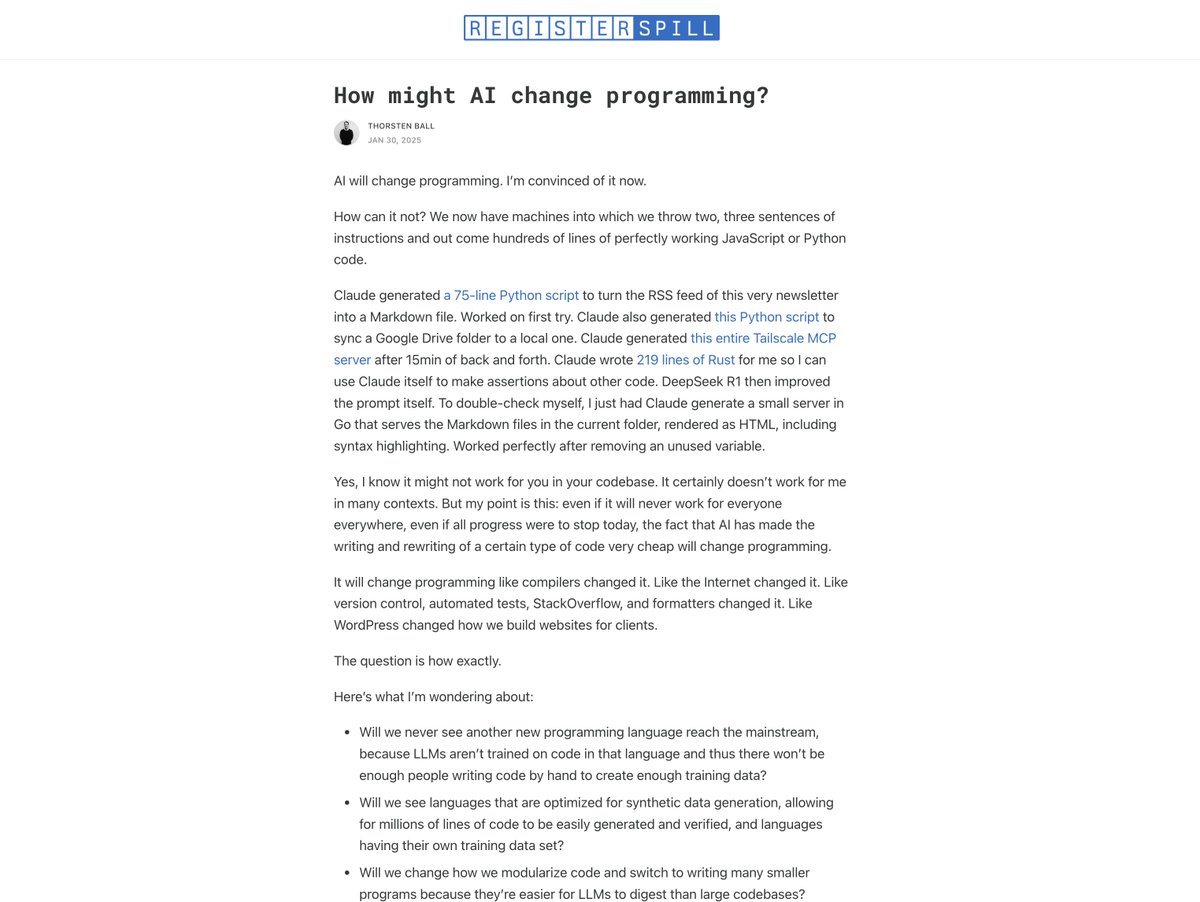
Dion Almaer
@dalmaer
Followers
28K
Following
81K
Statuses
42K
Bringing nuance to a knife fight, surprisingly older than @bgalbs. Work @ Tessl. Prev: Google, Shopify, Ajaxian & more. 🌥: @almaer.com 🧵: dionalmaer
🌎🕸
Joined April 2007
RT @auchenberg: In the age of AI, it's not about empowering the product manager to do more, but to empower the *whole team* to do the produ…
0
3
0
Relevancy for the win. And depending on your domain this may vary. Cosine Similarity won’t by right for many applications.
Traditional RAG sucks because it promises "relevant chunks" but in fact returns "similar chunks". Relevancy requires reasoning. Introducing ReAG - Reasoning Augmented Generation
0
0
3
I’m here for the abstraction bar raise!
AI is going to cause us to move to higher levels of abstraction of how we work. Each level of abstraction provides more leverage than the prior level, so each bit of input leads to vastly higher output. This has happened all throughout history when there’s major technological progress, from the Industrial Revolution with mechanical automation and in the Information Age with digital automation. The work that we do today looks far different from 100 or 50 years ago respectively. The same will be true again with AI. What we perceive is “work” today will continue to be redefined. When you can merely think of an idea to prototype and AI can generate the code, the timelines on building software suddenly alter. When you can instantly research a topic and understand it deeply without the hundred hours going down the wrong threads, you’ll move to the next task much quicker. This will naturally change what we spend our time doing each day in almost every field. Building software will be as much about reviewing code and considering the right prompts as it is writing the code. Delivering a healthcare outcome will mean having access to every bit of research at your fingertips instantly, augmenting anything you already know. Every domain will experience a similar impact. Skills will matter just as much as ever, but they will look different, just as skills have changed during every other technological revolution. And more people can get started in a field they’re interested in, while the experts in the field can get even more done than they could’ve before. In just a few years, we will look back on how we used to work and be utterly surprised how long everything took to do. It will seem implausible that you had to literally do everything yourself on a *computer*, the thing that was invented to help automate work.
0
0
3
@natfriedman “And Canada should be written with Russian letters and hidden in the list!” Jk ofc, location awareness ftw.
0
0
1
This is going to be biiiiiig. LLMs get learning this all quickly!
Tailwind v4 is coming. I’m not just upgrading—I’m refining everything: React 19 support, trying new patterns enabled by v4 and checking every community feedback on GitHub. I'm fully locked in. Lose Yourself & Till I Collapse on repeat. It's coming soon.
0
0
1
RT @kaushikm_: Introducing Wildcard Bridge & agents.json An open source spec connecting AI agents with APIs — built on the OpenAPI standar…
0
52
0
RT @iammerrick: The AI Native Dev is quickly becoming one of my favorite podcasts. Loved the recent episode with @dalmaer , @guypod & @guyg…
0
3
0
“It is very hard to be a completely first-class citizen in a software ecosystem while writing the core of the product in a different language.”
We initially wrote @replicache in Rust but hit this same problem and rewrote it in JS before it even launched. @rocicorp_zero carries on the same tradition - it's nearly 100% TS, except the server contains a slightly forked SQLite. This surprises a lot of people. There's a lot of performance/technical/dx issues but they can be summed up as: It is very hard to be a completely first-class citizen in a software ecosystem while writing the core of the product in a different language. True for iOS/Android, true for the desktop, and true for the web. For Zero, our core audience is web developers. We ourselves are web developers. The web is what we know and love, and we've chosen to focus there. This means writing Zero in TS, the web's lingua franca. Here are some examples of this principle from Zero: - We can only really create a high-quality TS DX *in* TS. - But if we create the DX in TS then marshaling costs back and forth between TS and wasm are very very large, quickly becoming dominant in something like Zero. - On the web bundle size is a significant part of the featureset. Very difficult to do small bundles with wasm/rust because there's no "runtime" built in with things like arrays, maps, memory management, etc. - We want to allow users to run the same queries on client and server. If we build the server in a different language we might gain perf (maybe - see marshaling above) but we add massive massive complexity. I still think we'll carve out bits of native code for Zero over time, but it will be done cautiously to avoid taking away from the high-quality ts experience we have today. One of my favorite mentors from years ago use to constantly say "engineering is all about tradeoffs" and I think about that all the time still. Just make sure you're aware of the tradeoffs you're making before you make them.
0
0
4















